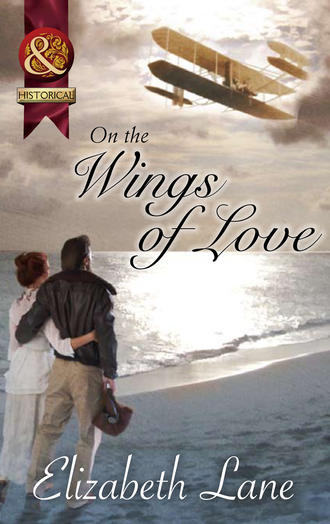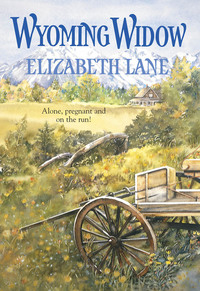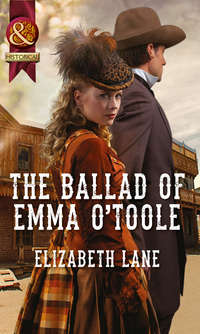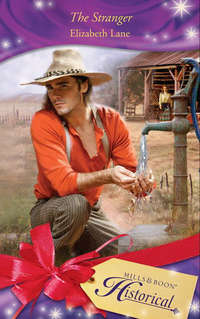
Полная версия
On the Wings of Love
Most of the party guests had lined up along the top of the dune to watch. Alex felt their eyes on her as she backed out of the water, her skirt dripping and encrusted with sand. Hands reached out to support the weight of the pilot’s torso. He stirred against her breast, his lips forming words she couldn’t hear.
Alex’s mother struggled down the slope toward her, walking sideways to keep from sliding in the loose sand. “What a sight you are, Alexandra!” she gasped. “I almost fainted when I saw you out there in the water.”
“The pilot’s hurt!” Alex said. “Have someone run to the house and telephone Dr. Fleury!” She cradled the man’s head, ignoring her mother’s outstretched arms. “Please, Mama, I’m fine!”
Her mother stared down at her, still hesitant. “But your gown—you’re covered with blood!”
Alex glanced down at the ugly lavender dress. The bodice and skirt were blotched with crimson. A little shiver went through her as she felt the pressure of the pilot’s firm jaw through the thin fabric. Her head went up. “Yes,” she said. “But it’s not my blood. It’s his.”
Chapter Two
Rafe awoke with a body-wrenching jerk. He had felt himself falling, spinning downward in a ripping descent that seemed slow only because it had no bottom. Now he felt the starch-crisped softness of a pillowcase against his cheek and realized he’d been dreaming. The dream had merged with reality until he was no longer sure where one left off and the other began.
Keeping his eyes tightly closed, he tried to piece together the fragmented memory of the crash—the plummeting plane, pulling on the stick until his hands bled, the water rushing upward to meet him. Then blackness, broken only by a flash of lucid pain.
Even then he’d been hallucinating, Rafe reckoned. Those violet eyes looking down at him could not have been real. Only angels had eyes like that. Or devils, maybe. And considering the life he’d led, Rafe would have been less surprised to find himself in hell than in heaven.
Not that it mattered. No body that ached as much as his could be dead. He was still among the living. But where?
Rafe forced his leaden eyelids to open.
The first thing he saw was sunlight streaming through a tall, cane-shuttered window. It was so bright that he had to close his eyes again. The hospital, he thought. That’s where he was. And running up the bloody bill, most likely. When they found out he wasn’t rich, he’d be out on the street.
He turned his head to one side, even that small motion hurting. Lord, what had he done to himself?
Concentrating, he willed his eyes to open again. This time he could see more of the room—a large teakwood armoire with oriental hardware; a richly woven Turkish carpet on the floor; a four-foot brass vase trailing the fronds of a huge, lacy fern. On the wall above the vase—Rafe gasped when he saw it—was the snarling, mounted head of a Bengal tiger.
A hospital? “Not bloody likely,” Rafe muttered out loud.
Burning with curiosity, he raised himself on one elbow and tried to sit up. Pain shot a searing path up his right leg as he twisted it. Broken, Rafe concluded dourly even before he felt the heavy splint. Broken nastily. It would be many weeks mending.
Blast! Rafe cursed his luck. Next week’s big air show, with $100,000 in prizes, was to have been the turning point of his life. He was gambling everything on the chance that he would find a backer to invest in the aeroplane he’d designed and built. He’d had a chance. A good chance. Now his aeroplane, his leg and his dreams all lay shattered.
Slowly Rafe sank back onto the pillow. He would rebuild the aeroplane, of course. And he would fly again. But he’d lost the season. He had missed his big chance. Damn! He glanced around the strangely exotic room again. Where in hell’s name was he, anyway? And where was his aeroplane?
The sound of approaching footsteps outside the half-open door broke into his thoughts. Instinctively Rafe froze. Life had taught him to be cautious. Even in a place like this, you could never tell who might be slinking around the halls. Once, in a perfectly respectable New Orleans hotel, he had gone to sleep and almost lost his life to a wallet-snatching bellhop with a stiletto in his boot. This place looked too ritzy for such shenanigans, but all the same…
Hinges creaked softly as the door swung all the way open. Rafe lay still, his eyes closed, as the footsteps padded across the carpet toward him. They were light and swift—a woman’s, Rafe guessed, relaxing a bit. Though a woman could be just as dangerous as a man. What would she look like? he caught himself wondering. Would she be young? Pretty? And what would she be doing in this room? He let her come closer, playing the game as long as he dared.
Now he sensed the light press of her body against the side of the bed. She was looking down at him. Rafe could feel her eyes, like sunlight on his face. His heart drummed against the wall of his chest, so loudly that he wondered if she could hear it.
She leaned closer. Rafe could hear the soft, feminine whisper of her breathing. He smelled no perfume, though. That was a bad sign. A perfumed woman approaching a man in bed usually had just one thing on her mind. That would be easy enough to manage, even with a broken leg—with a little cooperation from the lady, of course. But this female didn’t seem bent on seduction. She was too quiet.
Whatever her game, it was time to end it. Rafe opened his eyes. At the same instant, he moved, striking with the speed of a diamondback. Before the girl could even gasp, he had seized her arms in his two hands. He jerked her down and forward, bringing her face to a level with his own.
Startled eyes stared into his—violet-blue eyes, as cool and translucent as sapphires, and strangely familiar. Maybe he hadn’t been hallucinating after all. Or maybe he still was.
“Let me go!” she gasped.
“Not until you tell me where I am,” Rafe said.
She tried to pull away, twisting hard against the grip of his hands, but he was too strong for her. When she saw that she couldn’t escape, she stopped struggling. Her eyes glared at him through the tumble of her loose, tawny hair.
“Why, you stupid, addle-brained son of a baboon!” she said in a low voice. “If you want to know where you are, all you have to do is ask! There’s no reason for you to behave like an animal! Now let go of me, Mr. Garrick, before I scream bloody murder!”
Half amused, half embarrassed, Rafe let her go. The little spitfire was right about his behavior, he admitted grudgingly. If anyone in this place had meant to harm him, they could easily have done it while he was still unconscious from the crash. He had acted out of instinct. Acted rashly.
“How did you know my name?”
“It’s written on the lining of your jacket.” She had taken a couple of steps backward, giving Rafe his first real chance to study her. She was taller than he’d first realized. Prettier, too, with a windblown mane of hair and a face that could have been stamped on an ancient Greek coin, or used to launch a thousand ships. But she was dressed like a child, in a white middy blouse and a rumpled pongee skirt. Grains of sand clung to her bare feet. Innocence was written all over her. Rafe sighed. He liked his women experienced and eager.
“I’ve been down on the beach watching our groundskeepers dig your aeroplane out,” she said, keeping her distance. “They were almost finished when I left to check on you.” She ran a sun-browned hand through her hair, the motion pulling her blouse tight against one perfect, pear-shaped breast. Rafe felt the familiar surge of heat in his loins. Innocent or not, this female was no child.
“Not that I need have bothered,” she continued in a low, breathy voice. “You seem to have your strength back, Mr. Garrick.” Her straight, dark brows almost touched as she scowled at him. “What in heaven’s name did you think I was trying to do to you?”
Rafe tried to laugh and winced when it hurt. Maybe a rib or two had been cracked along with the leg. “You’ve got me there,” he said. “I’d just awakened, you see, and I didn’t quite have my bearings. I still don’t have them, for that matter, so if you’d care to explain—”
“You’re English, aren’t you?”
“What’s that got to do with anything?”
“The way you speak—you sound English,” she persisted.
“All right. My parents came over on a boat from Liverpool when I was twelve,” Rafe said a bit impatiently. And they both died of typhoid eleven months later in a filthy Brooklyn tenement, he kept himself from adding. He never made a habit of telling people his life story. People had enough troubles of their own.
“I thought so,” she said. “I’m good with accents.”
“Look,” Rafe said, wondering if the female was stalling on purpose or if she was just naturally exasperating, “I need to know some things, like where I am and how long I’ve been here. And I need to know about my aeroplane. How bad is the damage? If you can’t tell me, for Pete’s sake, stop babbling and go get somebody who can!”
He saw at once that he had pushed her too far. Her chin went up and her nostrils flared like a blooded filly’s. “You look, Mr. Garrick,” she said coldly. “When your aeroplane crashed I was the first to reach it. I found you hanging halfway out of the machine with your head in the water. I held you up and kept you from drowning while the men got your legs free—and I ruined a brand-new party gown in the process. Now that you’re awake and I’ve met you, I realize I should have saved the gown!”
With an angry swirl of her pongee skirt, she spun out of the door and was gone.
Rafe groaned. “Hey!” he called after her. “I’m sorry! Come on back!” But the silence, like the wet sand that glittered on the carpet where she’d stood, mocked him. Minutes passed, and she didn’t return.
There was nothing to do but get up and investigate the situation himself, Rafe decided. Gritting his teeth, he rolled over onto his right side. Slow and easy, that was the way. Once he was on his feet, maybe he’d be able to get to the bottom of this mess.
And a fine mess it was! He remembered crashing the aeroplane, but he knew nothing about his rescuers. The girl had said the groundskeepers were on the beach, digging the aeroplane free, but what did that mean? What did these people plan to do with it, and with him? He had to find out fast.
Beads of sweat stood out on Rafe’s forehead as he pushed himself to a sitting position. The pain in his ribs was nauseating. Cautiously he inspected his own body. Someone had dressed him in a pair of gray silk pajamas that were finer than anything he’d ever worn. One of the legs had been ripped open to accommodate the bulk of the splint. Under the jacket, his ribs were bound with strips of muslin. A patch of gauze dressing covered a gash on his forehead.
Well, so much for damage assessment. He could only hope the aeroplane was in better shape than he was. Bracing himself against the pain, he seized the splint with both hands and swung his legs to the floor. That was more like it. Except for his rear still being on the bed, he was almost standing. All he had to do now was get his body over his feet. Then, broken leg or no broken leg, he would walk out of here and find out what was going on.
Gingerly Rafe put his weight on his good leg and stood up. The room shimmered in front of his eyes. He forced himself to focus on the face of the mounted tiger, on the dead-cold yellow glass eyes and leathery black nose. Why would anybody hang up a dead animal anyway? Even the well-mounted ones were ghastly.
Staring into the tiger’s open jaws, he gathered his resolve. The leg was well braced. There was no reason he couldn’t walk on it if he was careful. Nothing was impossible. When he’d started on his aeroplane, nobody had believed he could do it. But he’d shown them all.
The tiger’s face had begun to blur, its stripes curving into a moiré before Rafe’s eyes. He willed the leg to move, willed himself to put weight on it. Pain was a state of mind…to hell with pain…He leaned forward, trusting the strength of the splint. Slowly his weight came down on the broken leg…
Then pain exploded in him, shattering balance and will. The tiger’s face vanished in a swirl of darkness as Rafe pitched helplessly forward. He lay still on the Turkish carpet, at the foot of the brass vase, no longer wondering or caring where he was.
Alex came out through the kitchen onto the back porch, letting the screen door slam behind her. “He’s awake,” she said. “I just saw him.”
Maude Bromley glanced up from her needlepoint. “Oh? Is he hungry? Do you think he’d like some soup? I can send one of the kitchen girls up with a meal.”
“I didn’t ask him.” Alex draped herself sideways across the arms of a wicker chair and fanned herself with a magazine.
“Alex, your manners—”
“He was rude, Mama. More than rude. He was awful! First he grabbed my arms. Then he told me to stop babbling. He didn’t even thank me for saving his life!”
“Well, give him time, dear. He’s had quite a shock. And that sedative Dr. Fleury gave him yesterday afternoon was supposed to make him sleep round the clock. You can hardly blame the young man if he’s not quite himself.”
“Oh, you’re always making excuses for people!” Alex stormed. “For Papa, for everybody, even total strangers!”
“And for you, Alexandra. Something tells me it wasn’t just Mr. Garrick who was rude. If the truth be told, young lady, you’ve a sharp tongue in that pretty head. If you’re ever to find a good husband, you might do well to bridle it.”
Maude had spoken in the gentlest of tones, her thin fingers never missing a stitch of the rose pattern she was outlining in fine, mauve wool. Alex studied her mother, trying to imagine what she had been like as a girl, long before Buck Bromley came into her life. She seemed so controlled now, as if her emotions were encased in glass. Had she ever laughed loud and openly? Had she ever cried into her pillow at night?
Maude had not married young. At twenty-eight she had been an old maid by the terms of the day, a quiet, bookish young woman who’d kept house for her widowed father and worked half days at a nearby public library. Buck had been younger than Maude, uneducated and uncouth. She had taught him how to speak properly and how to eat a six-course dinner without using the wrong fork. Aside from that, what had they ever seen in each other? Alex wondered.
“If I marry, it will be to a man who loves me as I am,” she said, swinging a bare leg over the side of the chair. “Otherwise, I’ll stay single, thank you.”
Maude measured a strand of wool and clipped it with her tiny silver scissors. “Why should love be so important? I was in love with your father, and in the end, what difference did it make?”
The revelation caught Alex off guard. Her lips parted but she did not speak.
Maude smiled her quiet smile and resumed her needlepoint. “Some of the best marriages I know are based on suitability, not love,” she said. “It’s best that way, you know. When a woman is not quite in love with a man, she has…balance, let’s say. She’s able to keep a bit of the power for herself and look at life with her eyes open. When he hurts her—which every man does sooner or later—”
“I would never marry the sort of man who’d hurt me!”
“Time will tell, dear.” Maude’s needle slowed. “But a woman who’s not quite in love can bear the hurt. She can tend to her own affairs and wait for the pain to pass. She can be sensible. On the other hand, a woman who lets herself fall in love with a man gives up everything. He gains total power over her—power to dominate, power to hurt…And he’ll use it. No man can resist using it.” She paused to unravel a tangle in the yarn. Her fingers trembled slightly.
“Mama—” Alex reached out, hesitated, then put her hand back in her lap.
“Never give a man all your love, Alexandra. Always hold back a little for yourself, for your own survival. I know that sounds like cynical advice, but as you grow older, you’ll find it to be quite sound.”
She lowered her bespectacled eyes as if she’d just realized she had said too much. Feeling awkward, Alex gazed at the clouds. Her eyes followed the flight of a storm petrel. Briefly she thought of the aeroplane. How fragile it had looked against the vastness of the sky. How free.
“You’re wrong, Mama,” she said softly. “If I ever get married it will be for love, and nothing else.”
“That’s your choice, dear.” Maude spoke without looking up, as if she had just closed a window in her mind. “I hope you’ll be very happy.”
Alex shaded her eyes and gazed toward the dunes. On the beach, half a dozen men who worked for her father had spent the morning trying to free the wrecked aeroplane from the wet sand before the tide came in. Now she could see them coming up over the rise. They were bringing the flying machine with them, half dragging, half carrying the twisted wreckage onto the lawn. Seeing it now, Alex could not help marveling that Rafe Garrick had survived the crash at all. The craft’s double wings were intact, but the front struts were crushed. The rear was askew, and the engine hung precariously from the sagging frame.
“Poor Mr. Garrick!” said Maude.
“Pooh! He got out alive, didn’t he?” Alex’s feigned disinterest masked a sense of wonder. This shattered wreck of wood, wire and stiffened cloth had flown in the sky. Its pilot had seen the earth as she herself had never seen it—the sweep of the land, with clustered towns and pencil-line roads; the alabaster curve of beach where land met sea; the harbor, with boats scuttling like water striders on a pond. Rafe Garrick had soared over hills and valleys. He had looked down on birds and on the sun-gilded tops of clouds.
Then, like Icarus, he had fallen out of the sky.
“If he’s awake, he’ll want to know about his aeroplane,” Maude said. “Maybe you ought to go and tell him they got it off the beach. And while you’re at it, maybe you should ask if he’d like the servants to bring him some lunch.”
Alex turned her head to let the breeze cool her sweat-dampened hair. “I don’t want to go back in there, Mama. He’s rude. I…don’t think he likes me. I don’t think I like him, either.”
“That’s no excuse, Alexandra. Anyone can learn to keep a civil tongue.”
“Someone should tell Mr. Garrick that.” Alex tossed her head. “I’ve had my turn with him, thank you.”
Maude’s breath eased outward in a sigh of defeat. “You’re as strong-willed as your father! All right, I’ll go and talk to Mr. Garrick, and you get ready for the tea at Mrs. Townsend’s this afternoon. You really ought to bathe if there’s time.”
“Mama, you talk to me as if I were still five years old. I’m a grown woman. I think I’m old enough to decide whether or not I ought to bathe,” Alex said.
Maude tugged at a stubborn strand of wool. “Now what did I tell you about that sharp tongue, Alex? Talk to other people the way you talk to me, and you may find yourself very sorry one day.” The yarn had tangled again. Maude fell silent for a moment while she worked it free. “And while we’re at it,” she continued, “what’s this I hear about you driving?”
“Driving?” Alex parroted the word, trying to sound innocent, though she knew it wouldn’t work.
“Elvira Hodge told me she saw you flying down the road in your father’s Pierce-Arrow last night. She said you must have been going at least thirty-five miles an hour.”
“I like driving autos. And I like going fast.”
“It isn’t safe. What’s more, it isn’t ladylike.”
“Alice Roosevelt drives.”
“Alice Roosevelt also smokes. Does that mean every young girl in America should take up the disgusting habit?” Maude removed her glasses, folded the needlepoint and put it back into her wicker sewing box. “Alexandra, I’m not going to sit here and waste time arguing with you. No matter what I say, you’ll do as you please. I’m going inside now to see if Mr. Garrick needs anything from the servants.”
She rose to her feet, tall and pale in a dress of gray batiste, her light brown hair coiled into a double chignon and covered with a net. She closed the screen carefully as she went back into the house.
Alex watched her mother go, sorry now that she had been so difficult. Maude’s life was hard enough without a contrary and willful daughter adding to the burdens of it. Alex knew. She knew it all too well.
She remembered her first year at boarding school. She’d been only fourteen at the time, and racked with homesickness. On a dreary November Saturday she had impulsively caught a train home, arriving at the station just after dusk.
Alex would never forget the look of the house that evening as she walked up the drive—strangely dark and brooding, with just one light, dimly flickering in the window of her parents’ bedroom. Buck’s dark green Cadillac was parked at the foot of the front steps.
The door was unlocked. Alex stepped into the cavernous foyer. “Mama? Papa?”
No one had answered, not even the servants. Alex had been close to tears before she remembered that this was the night of her mother’s big charity ball. Not only would she be busy running the affair at the country club, but Mamie, the cook, and Cummings, the butler, would be helping as well.
That was when she’d heard it—the creak of a floorboard in an upstairs room, and faintly, the rumble of her father’s laughter.
“Papa!” she’d whispered eagerly. She was not alone after all. Grabbing her satchel, she’d raced up the stairs.
At the landing she’d hesitated. The upstairs hallway had been dark, the door to her parents’ bedroom closed. Only a sliver of yellow light had shone through the crack at the bottom.
Trembling, Alex had listened and waited. At last her hand had crept to the doorknob, then hesitated as she heard another sound, a rhythmic creaking that sounded like a bedspring.
Then, from beyond the door, a high-pitched laugh—a woman’s laugh, certainly not her mother’s—had shattered the darkness.
Alex had never told anyone about the experience. It remained imbedded in her soul like a splinter, as sharp and painful as the day it had happened.
Now, gingerly, she explored the tender area. She had to understand it. Sooner or later she would likely be married. She would be vulnerable, open to the same hurt and betrayal her mother had suffered. And she was afraid.
But surely she’d have the sense to fall in love with someone kind and decent, someone who would cherish and respect her. Not all men were like her father, Alex reassured herself. Or like Rafe Garrick.
She caught her breath, stunned by the force with which the young pilot’s image had entered her mind. Impressions rushed over her—standing in the surf with her arms around him, his head heavy against her breast, his dark, wet lashes lifting to give her the first glimpse of his eyes. She remembered afterward, undressing in her room, standing naked before the mirror, then picking up the sodden purple gown to touch the spots that were stained with his blood.
And only a short time ago she had come up from the beach and gone into his room. He had been sleeping—or so she’d thought. She had stood beside his bed, her eyes tracing the strong, stubborn lines of his face, the oddly attractive twist of his broken nose, the wave of dark chestnut hair that tumbled onto his forehead. A warm sense of possession had stolen over her. After all, hadn’t she been the first to reach him? Hadn’t she saved him from the sea? It was almost as if part of his life belonged to her.
Then Rafe Garrick had awakened, banishing all her illusions. He was not the kind of man to be possessed by her or by anyone. He was arrogant. He was quarrelsome. For all she knew, he could be out of his mind. And she would be out of her own mind as well, Alex told herself, if she had anything more to do with him.
“Alex!” Maude’s stricken cry from the upstairs window shattered her thoughts. “Telephone Dr. Fleury quickly! Mr. Garrick has fallen! I fear he may be dead!”








